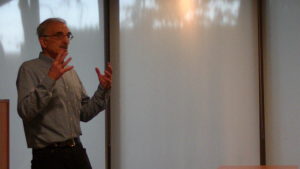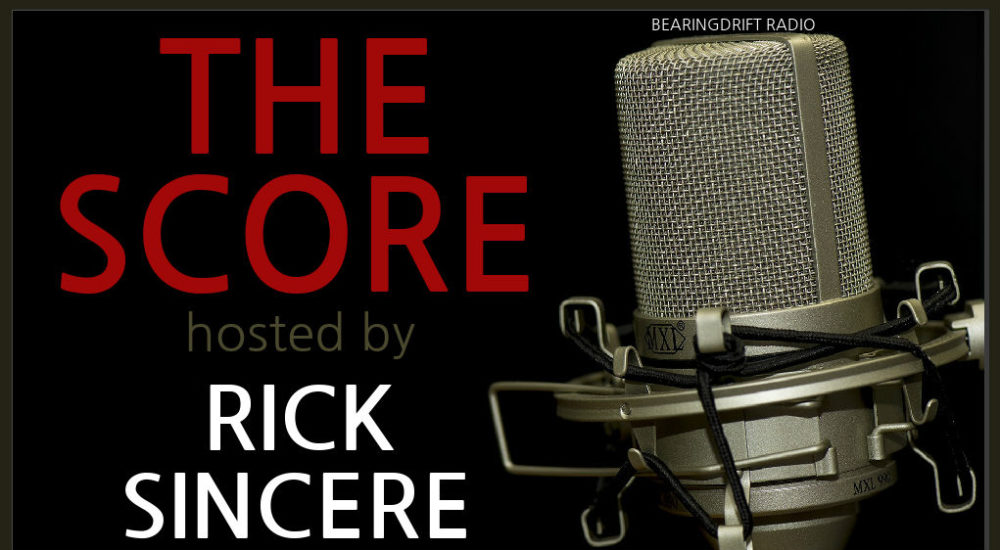The Score: Monacan Millennium, D-Day Remembered, Oklahoma! Reviewed, Panic Attack, Iraq War
This week on The Score – What were the mistakes leading up to the Iraq War? Who were Virginia’s earliest inhabitants? Are there lessons from D-Day that apply in the twenty-first century? Is there hope for free speech on college campuses? Should you see the Broadway revival of Oklahoma!?
This week’s episode of The Score features interviews not with one, not with two, not with three but with four authors. Topics range from the Monacan Indians to the Iraq War to contemporary college culture. We also will hear from our critic-at-large about a big Broadway musical.
 First, University of Virginia anthropologist Jeffrey Hantman has written a new book called Monacan Millennium: A Collaborative Archaeology and History of a Virginia Indian People (2018), which explores the history and culture of one of the groups of Americans who were already here when the English settlers first landed in 1607. We spoke about a week ago after he gave a lecture in Charlottesville, sponsored by the Charlottesville Museum for History and Culture.
First, University of Virginia anthropologist Jeffrey Hantman has written a new book called Monacan Millennium: A Collaborative Archaeology and History of a Virginia Indian People (2018), which explores the history and culture of one of the groups of Americans who were already here when the English settlers first landed in 1607. We spoke about a week ago after he gave a lecture in Charlottesville, sponsored by the Charlottesville Museum for History and Culture.
Hantman is also co-editor (with Peter Onuf and Douglas Seefeldt) of Across the Continent: Jefferson, Lewis and Clark, and the Making of America (2006).
Herman on D-Day
Next, we are coming up on the seventy-fifth anniversary of the D-Day landings on June 6, 1944. A few years ago, I had the opportunity to speak with historian Arthur Herman about his book on the industrial effort during the Second World War, Freedom’s Forge: How American Business Produced Victory in World War II. We ended our conversation with his thoughts about D-Day:
The numbers of ships and landing craft [used on D-Day] were, almost two-thirds of them, produced in American factories. It’s a tribute not just to the bravery of our armed forces, but also to the huge logistical possibilities that American industry could generate a landing in an enterprise of the sort that the world had never seen.
The second thing that I think about when I think about D-Day and relationship to Freedom’s Forge is the very first Americans to get news that the landings were successful were people working the night shifts in the factories on the East Coast, in places like Baltimore and Sparrow Point at the shipyard that was set up there. In fact, at the Bethlehem shipyard, work stopped when everybody sank to their knees and said the Lord’s Prayer as they got the news. I think that’s really fitting: with the people who produced the tools that made that victory possible heard the very first word that what they had done and what they contributed to had been a success.
About a year ago, The Score excerpted another part of my June 6, 2012, conversation with Arthur Herman, who is also the author of Douglas MacArthur: American Warrior (2016), Joseph McCarthy: Reexamining the Life and Legacy of America’s Most Hated Senator (1999), and Gandhi and Churchill (2008), among several other books.
Herman tweets from @ArthurLHerman.
Dark Oklahoma!
Our critic-at-large, Tim Hulsey, has been spending time in New York theaters. This week he reviews a controversial new revival of the classic Broadway musical, Oklahoma!, which has been nominated for eight Tony awards. Tim came away from the show with a sense of foreboding.
In many ways, Oklahoma! would seem like the most innocuous of shows, but this new production — with a few moments of innovative staging and a truckload of hateful hooey between them — is a reminder of how times have changed, and not for the better.
But Richard Rodgers and Oscar Hammerstein wrote the musical Oklahoma! in 1943, when America was in the midst of World War II, the closest thing we had to a full on existential crisis since the Civil War. Americans were fighting the Axis, and New Yorkers and Midwesterners were all in it together. In the midst of the war, Hammerstein adapted a play by Oklahoma author Lynn Riggs entitled Green Grow the Lilacs, which was old fashioned even then. Still, this musical had some major innovations in its favor. Agnes DeMille’s choreography brought the high art of ballet to Broadway in a manner that developed the story and Richard Rodgers contributed a soaring score that became the gold standard for musical theater.
With this new revival, director Daniel Fish makes hash of all of that. He trashes Hammerstein’s book, makes the pacing erratic when not glacial, replaces the show’s famous ballet with a bizarre, self-indulgent parody of modern dance and hands Rodgers’ lush orchestral score over to a seven- piece country/western band. It’s a tribute to the durability of the material that it can remain somewhat watchable, even under these unpropitious circumstances, at least a part of the time, but this production isn’t content with attacking a well-written show. Above all else, it wants to make clear that Americans can’t be united anymore, and that the subhumans of the American heartland are entirely to blame for the divisions that beset us.
Leap of Faith
It’s been more than a quarter-century since the first Gulf War and about sixteen years since the United States invaded Iraq. Michael Mazarr, a political scientist and policy analyst at the RAND Corporation, has written a book examining the decision-making process that led to the Iraq War in 2003.
I spoke to him on Thursday at his office in Arlington, Virginia. I started by asking him how he pitched his book, called Leap of Faith: Hubris, Negligence, and America’s Greatest Foreign Policy Tragedy, to potential publishers.
The pitch is complicated by the fact that we’re a ways away from the Iraq War and so some folks may not have the same interest they did. But to me, the issue is still relevant because one of the main questions about Iraq is how a group of senior, very experienced, and in all cases, very intelligent, national security leaders could have taken a step that, in retrospect, had so many obvious faults and flaws to it — and that is a question that applies to lots of kinds of decisions and national security, some of which we’re dealing with today.
In the interest of full disclosure, I should note that Mazarr and I worked together briefly at the Ethics and Public Policy Center in the 1980s; he took over my position there when I left for graduate school. We also overlapped at the Center for Strategic and International Studies in the early 1990s.
In addition to Leap of Faith, Mazarr is author of Mastering The Gray Zone: Understanding A Changing Era of Conflict (2015), Unmodern Men in the Modern World: Radical Islam, Terrorism, and the War on Modernity (2007), North Korea and the Bomb: A Case Study in Nonproliferation (1997), Nuclear Weapons in a Transformed World (1997), and Mexico 2005: The Challenges of the New Millennium (1998), among other works.
Panic Attack
 Robby Soave writes about education policy and related topics as an associate editor for Reason magazine. He now has written a book, titled Panic Attack: Young Radicals in the Age of Trump, which explores the current state of free speech on college campuses. I caught up with him on Thursday in Washington in the middle of a party celebrating the publication of his new book – that explains the noise in the background.
Robby Soave writes about education policy and related topics as an associate editor for Reason magazine. He now has written a book, titled Panic Attack: Young Radicals in the Age of Trump, which explores the current state of free speech on college campuses. I caught up with him on Thursday in Washington in the middle of a party celebrating the publication of his new book – that explains the noise in the background.
Soave previously appeared on The Score in March. He can be found on Twitter as @RobbySoave, where he said our listeners will be able to learn about public appearances he has scheduled to talk about Panic Attack.
We have at least one interview confirmed for the next episode of The Score. I talked to Dr. P. Preston Reynolds, a physician and medical historian, about the sordid relationship between the University of Virginia and eugenics, the pseudoscience of racism. There will also be additional topics from news and popular culture.
Those who are interested can also tune in each Monday afternoon to 94.7 WPVC-FM in Charlottesville. From 4 to 6 p.m., I’m part of a roundtable panel discussion about the week’s headlines.





